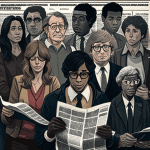Housing Opportunities Made Equal of Virginia sets sights on reform, working to change housing policy in the Commonwealth by informing the public through art.
On chilly winter mornings, patrons begin gathering at the steps of the main branch of the Richmond Public Library to await its 10am opening.
A security guard pulls open the doors, and as library guests begin funneling in, they are greeted first not by a bookshelf or a computer lab; instead, the first thing that visitors see when entering the library are two tall columns of brown blocks, with “EVICTION CRISIS” stenciled in white letters. They are surrounded by what appears to be bags of trash. Instead of bookshelves, visitors are entering an art exhibit, with doorknobs, keys, Monopoly homes, and broken outlets highlighting Richmond’s eviction rates on orange and black posters.

The exhibit is a current project from Housing Opportunities Made Equal of Virginia, a Richmond-based organization whose mission is “to ensure equal housing access to all people.” Through advocating for legislation and community outreach, HOME of Virginia has its goals set on changing housing policies in the Commonwealth.
In the current General Assembly session, HOME’s main concern has been adding sexual orientation and gender identity protections to the Fair Housing Act of Virginia. Both the House of Delegates and Senate versions of that bill passed their respective chambers on February 6.
“We’ve been working almost two decades on that,” said Mike Burnette, Director of Communications for HOME. “That’s going to be a huge change. We have never moved the needle this far.”
HOME’s other main legislative focus is House Bill 6, introduced by Del. Jeff Bourne, D-Richmond, which “adds discrimination based on a person’s source of income to the list of unlawful discriminatory housing practices.” The bill passed the House on February 7 and the Senate on March 3.

HOME began in September 1971 to enforce the Fair Housing Act. Burnette says its biggest win as an organization came in 1982, when Havens Realty Corp. v. Coleman went to the Supreme Court of the United States. The ruling allowed anyone aware of a fair housing violation to sue, including “testers” who are looking for violations.
“That really changed the way we do things, not just for housing organizations, but any other organizations that want to sue,” Burnette said.
Today, HOME employs testers to act as prospective renters, in order to see if local landlords are complying with fair housing policies.
Currently, the organization employs around 30 full-time employees, and is funded primarily by government grants from the U.S. Department of Housing and Urban Development, as well as from state and local governments. Aside from those sources, Burnette said HOME receives funding from foundations, institutions, individual donors, and companies, including Wells Fargo, the only corporate sponsor of the “Eviction Crisis” art exhibit.

HOME president Heather Crislip said the organization will ensure equal housing access, and address the systemic barriers that prevent implementation of fair housing policies.
As for the exhibit, Burnette says this current display is expected to at least ride through this full year, but did not rule out future art exhibits.
“We’ll see what the next crisis is, or the next issue that we feel we need to raise up,” Burnette said.
Scott Firestine, director of the Richmond Public Library, said the exhibit is among the best of his tenure. According to Firestine, the exhibit achieves the library’s mission to inform, enrich, and empower.
“The best and most rewarding thing to happen as a librarian is that people are using this to become informed,” Firestine said. “Then they are asking, ‘What can I do?”
Top Photo by Jason Boleman



